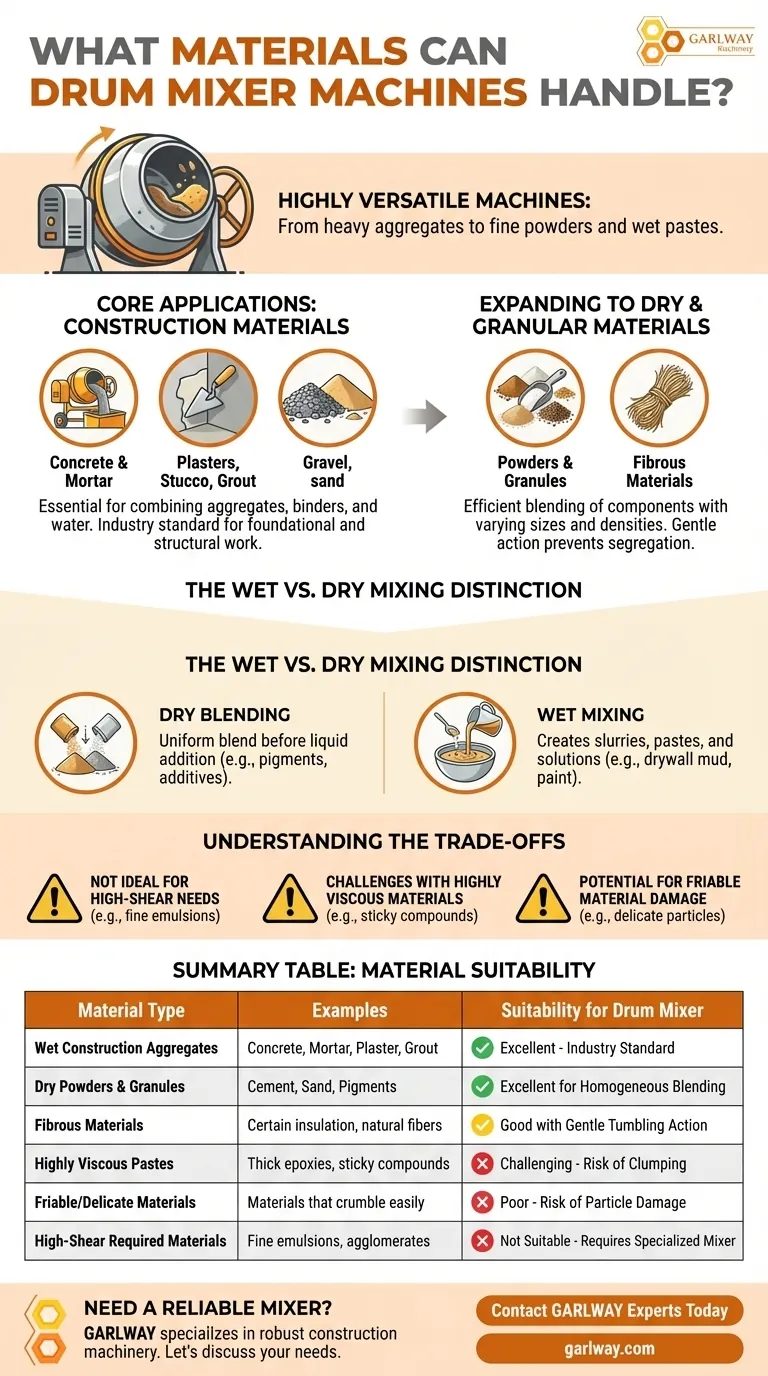In short, drum mixers are highly versatile machines capable of handling a wide range of materials, from heavy construction aggregates like concrete to fine powders and even wet pastes. Their simple, robust design makes them a staple for blending components of varying sizes and densities into a uniform mixture.
The core principle of a drum mixer is its ability to gently tumble and combine materials. This makes it ideal for everything from standard concrete and mortar to more specialized applications involving dry powders, granules, and various wet mixes.

Core Applications: Construction Materials
The most common application for drum mixers is in construction, where they excel at combining aggregates, binders, and water into a workable mixture.
Concrete and Mortar
This is the quintessential use for a drum mixer. The machine effectively combines cement, sand, gravel, and water to create a homogeneous batch of concrete or mortar for foundational, structural, or masonry work.
Plasters, Stucco, and Grout
Drum mixers are also well-suited for blending materials like plaster, stucco, and grout. Their tumbling action ensures that pigments and additives are evenly distributed, which is critical for achieving a consistent finish and color.
Expanding to Dry and Granular Materials
Beyond wet construction aggregates, many industrial drum mixers are specifically designed to handle dry components with precision.
Powders and Granules
The mixer can efficiently blend powders and granules, even when they have widely different particle sizes or bulk densities. The continuous rotation lifts and drops the material, preventing segregation and ensuring a consistent final product.
Fibrous Materials
Certain rotary drum mixers are also capable of handling fibrous materials. The gentle tumbling action is effective for blending these materials without causing damage or breaking down the fibers.
The Wet vs. Dry Mixing Distinction
A key aspect of a drum mixer's versatility is its ability to perform both wet and dry mixing, depending on the machine's design and the project's goal.
Dry Blending
In this process, all dry components (like powders, sand, or cement) are mixed first to achieve a uniform blend before any liquid is introduced.
Wet Mixing
This is the more common application, where a liquid is added to create a slurry, paste, or solution. Materials like drywall mud, terrazzo, paint, and even some epoxies can be effectively mixed this way.
Understanding the Trade-offs
While highly versatile, drum mixers are not the perfect solution for every mixing task. Understanding their limitations is key to using them effectively.
Not Ideal for High-Shear Needs
Drum mixers provide a gentle, tumbling action. They are not suitable for materials that require high-shear force to be properly blended, such as creating fine emulsions or breaking down tough agglomerates.
Challenges with Highly Viscous Materials
Extremely sticky or pasty materials can be a challenge. They may clump together or stick to the sides of the drum, leading to an inconsistent mix that does not tumble freely.
Potential for Friable Material Damage
For very delicate or friable materials (those that crumble easily), the continuous dropping action inside the drum could cause unwanted breakdown or degradation of the particles over a long mixing cycle.
Making the Right Choice for Your Goal
To determine if a drum mixer is right for you, consider the primary characteristics of your materials and your desired outcome.
- If your primary focus is standard construction jobs: A drum mixer is the industry-standard tool for concrete, mortar, stucco, and grout.
- If your primary focus is blending dry powders or granules: A rotary drum mixer is an excellent choice for creating a homogeneous dry blend efficiently.
- If your primary focus is creating a high-viscosity paste or a fine emulsion: You should consider a specialized high-shear or paddle mixer designed for that specific task.
Ultimately, a drum mixer's value comes from its simple, effective method of tumbling materials into a consistent blend.
Summary Table:
| Material Type | Examples | Suitability for Drum Mixer |
|---|---|---|
| Wet Construction Aggregates | Concrete, Mortar, Plaster, Grout | Excellent - Industry Standard |
| Dry Powders & Granules | Cement, Sand, Pigments, Additives | Excellent for Homogeneous Blending |
| Fibrous Materials | Certain insulation, natural fibers | Good with Gentle Tumbling Action |
| Highly Viscous Pastes | Thick epoxies, sticky compounds | Challenging - Risk of Clumping |
| Friable/Delicate Materials | Materials that crumble easily | Poor - Risk of Particle Damage |
| High-Shear Required Materials | Fine emulsions, tough agglomerates | Not Suitable - Requires Specialized Mixer |
Need a Reliable Mixer for Your Construction or Industrial Blending Project?
GARLWAY specializes in providing robust and efficient construction machinery, including concrete mixers and batching plants designed for contractors and construction companies worldwide.
Whether you're working with standard concrete, dry powders, or other materials discussed, we can help you select the right equipment for consistent, high-quality results.
Let's discuss your specific needs and find the perfect mixing solution for your job site.
Contact GARLWAY Experts Today for a personalized consultation and quote.
Visual Guide

Related Products
- Ready Mixer Machine for Construction Ready Mix Machinery
- Concrete Cement Mixer Machine Drum Mixer for Construction
- Shaft Mixer Machine for Cement and Regular Concrete Mixing
- Commercial Construction Mixer Machine for Soil Cement Mixing Concrete
- Auto Concrete Cement Mixer Machine New
People Also Ask
- What safety considerations are important for concrete mixer operation? A Guide to Proactive Risk Management
- Can a concrete mixer be used for mortar? Understanding the trade-offs for your project
- When was the first concrete mixer developed and by whom? Discover the 1900 Breakthrough
- Why is cleaning a concrete mixer after use important? Avoid Costly Repairs and Ensure Quality
- Why is the manufacturer's strength and service important when choosing a concrete mixer? Ensure Long-Term Project Success



















